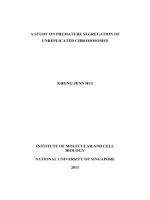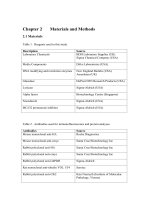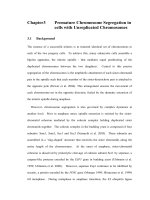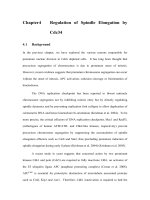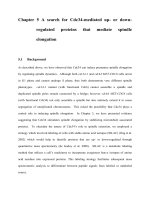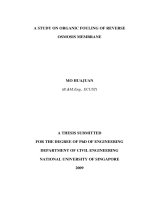A STUDY ON LEARNING EXPERIENCES OF VIETNAMESE MASTER STUDENTS IN THE FIELD OF ENGINEERING AT a TAIWAN UNIVERSITY
Bạn đang xem bản rút gọn của tài liệu. Xem và tải ngay bản đầy đủ của tài liệu tại đây (291.42 KB, 11 trang )
Tạp chí Đại học Thủ Dầu Một, số 5(7) - 2012
A STUDY ON LEARNING EXPERIENCES OF
VIETNAMESE MASTER STUDENTS IN THE FIELD
OF ENGINEERING AT A TAIWAN UNIVERSITY
Tran Thi Ha Thai
Tien Giang University
ABSTRACT
The study aims to explore the learning experiences of Vietnamese master students in the
field of engineering at a Taiwan university to offer a well-known perception of learning
experiences for Vietnamese prospective engineering students who look for foreign degrees in
non-English-speaking Asian countries like Taiwan. Interviews with 14 master students were
undertaken. The findings reveal that the Vietnamese students experience with 3 types of
language-related problems in Taiwan: English language proficiency, lack of English medium
of instruction from the host, and Chinese language issues. However, these language-related
problems seem not to affect seriously their academic performance since they are in engineering
disciplines, considered as linguistically less demanding courses, as well as study and live in
Chinese environment. The study, therefore, argues that for Vietnamese students who want to
enroll in English-taught programs in non-English-speaking Asian countries, they should think
there may be other types of unexpected language-related problems they have to experience
beyond English language proficiency. Based on research findings, suggestions for prospective
Vietnamese students are also proposed in this study.
Keywords: learning experiences, Vietnamese students,
engineering disciplines, Taiwan
1. Introduction
Along with expansion in the number of
young people going overseas for degrees,
studies on international students’ issues have
been addressed. Since English is the current
lingua franca, issue of whether the host
countries have offered English-taught programs is considered by those students who
intend to study in non-English spea-king
countries. Though the traditional pat-tern of
student mobility is from developing countries
to the United States or Western countries (de
Wit, 2008), the merging potential players in
Asian countries, such as China, Japan,
Singapore, Malaysia, Taiwan and South
Korea are noted (Lasanowski, 2009). In
Taiwan, there has been significant increase
in the number of international students,
especially
since
Taiwan
govern-ment
launched the Taiwan Scholarship Program in
2004 to provide financial incen-tives for
Taiwan universities to recruit inter-national
students (Lo, 2009). Among origins of
sending students to Taiwan, Vietnam
considered as a significant figure due to the
fastest increase in the number (see Figure 1).
73
Journal of Thu Dau Mot university, No5(7) – 2012
In 2010, Vietnam was ranked at top 2,
followed by Malaysia, with 3,282 enrollments (Taiwan MOE, 2010). In the context
of increasing number of international students in Taiwan, the question of exploring
the learning experiences of international students must be addressed to provide feedbacks
for the host in internationalizing its higher
education as well as offering sui-table support
programs for international students. In addition, it also provides information for prospective students to have well-preparation for
their study abroad. Therefore, this study aims
to explore the learning experiences of Vietnamese master students in the field of
engineering at a Taiwan university to offer a
well-known perception of learning experiences
for Vietnamese pros-pective engineering
students who look for foreign degrees in nonEnglish-speaking Asian countries like Taiwan.
ment. As early as 1982, in a study of Church
who reviewed the adjustment of foreigners,
it was found that international students in a
variety of host countries faced with the same
problems over the last 30 years. The most
challenges identified were language difficulties,
adjustment
to
new
educational
system, financial problems, personal problems, and social adjustment (Church, 1982).
Over the next 20 years, the problems facing
international students, which reported on a
number of studies on learning experiences,
were mainly the same to what Church listed
in his review in 1982. These challenges
were also language difficulties, academic
stress, academic workload, adjusting to the
host culture, financial problems, and so on
(e.g., Brown, 2008; Campbell & Li, 2008;
Wan, 2001; Warwick, 2006).
Among challenges felt by international
Figure 1: Vietnamese Student Enrollments in
Taiwan Universities
students in the host, language-related issues
were unavoidable their experiences in both
academic study and social life. They included
difficulties in listening and speaking, difficulties in understanding slang, idioms, common
vocabulary, and topics of conversations,
English academic writing and reading, and
lack of confidence in using English in daily
life (e.g., Brown, 2008; Kwiper & Tan, 2007;
Pan et al., 2008; Warwick, 2006). However,
in a study on language problems faced by
Chinese students in Australia, Zhang and
Mi (2009) pointed out another look at these
(Source: Taiwan MOE, 2008 and 2010)
2. Literature review on learning
experiences of international students
issues toward different disciplines. For
students in linguistically less demanding
courses, though they still face with diffi-
Learning experiences have been well-
culties in listening and speaking, English
recognized in the literature with such
language problems seem not to affect
challenges for international students to
seriously their academic performance and
experience and adjust to the host environ-
74
Tạp chí Đại học Thủ Dầu Một, số 5(7) - 2012
these issues are nearly gone after 2 years of
Tan, 2007). Apart from lectures, the inter-
stay in the host (Zhang & Mi, 2009).
national students often spent time on
campuses. Their free time was used mainly
Apart from the international students’
in the libraries or computer labs for self-
feelings toward their English language
study. Lack of engagement with local com-
proficiency, they may face with challenges
from
the
host
academic
munities was another common picture of
environment
international students stay in the host. The
through teamwork and class discussions. For
students,
instance, in a study given by Taras and
to
ces of international students is rich, there are
local students in class discussions or group
also some gaps in the literature motivating
meetings due to inequalities in language
for this research to be conducted. Firstly,
proficiency. As a result, they may be
most of studies on learning experiences of
evaluated as less active participation in class
international students mainly focus on those
discussions which result in lower academic
in English-speaking countries. Therefore,
performance by team-mates and teachers.
exploring the experiences of those in non-
Taras and Rowney (2007) also pointed that
traditionally desirable destinations, such as
international students are likely to be paid
Taiwan, Korea, and Japan in which English
less attention, even may be interrupted, by
is used as second language for both the stu-
team-mates when they share their opinions.
dents and instructors, is really wanting.
Consequently, the cross-cultural opinions
Secondly, Vietnamese students though are
among members in groups are not shared
well-recognized in pursuing foreign degrees,
effectively as well as valuable ideas may be
surprisingly to be noted that little infor-
ignored (Taras & Rowney, 2007).
mation is know about their experiences in
With such challenges felt by interna-
the host. Finally, while engineering disci-
tional students, they also have their own
plines are considered as linguistically less
experiences to adjust in the host. For
demanding
example, students from non-English spea-
courses,
the
perceptions
of
engineering students may be different from
king background often joined into groups
others in linguistically demanding courses.
with their conational students to react to
in
chances
Though literature on learning experien-
tional students are likely to speak less than
problems
missed
perfect their English (Kuiper & Tan, 2007).
Rowney (2007), they stated that interna-
language
therefore,
However, there has been lack of literature on
English-speaking
learning experiences of international stu-
countries (e.g., Brown, 2008; Kuiper & Tan,
dents in particular field. This study, there-
2007; Singh, 2005). Due to low English
fore, attempts to address these gaps.
language proficiency, they often felt low self-
3. Research method
confident in speaking English and making
friends with local people (Singh, 2005).
3.1. Research Design
Despite seeking English environment to
The study employed semi-structured and
improve English language, they spent less
in-depth interviews. Based on the purpose of
time to speak English language (Kuiper &
the study, interview schedule was also
75
Journal of Thu Dau Mot university, No5(7) – 2012
proposed and passed to participants in
3.2. Participants
advance. There are 3 parts in the interview
The 14 Vietnamese students, who were
schedule. First, the participants’ background
studying master programs in engineering
details were collected. Second, the views of
disciplines at a Taiwan university, were
the participants regarding their experiences
invited to join this study. All participants
in academic and social life after arrival in
obtained full scholarships as international
Taiwan were sought. Finally, the parti-
students in Taiwan. At the time of this
cipants’ experiences regarding using langua-
research, they ranged from 23 to 28 years of
ges in a non-English-speaking Asian country
age, with 12 males and 2 females. They had
like Taiwan were also examined.
Participation
in
the
stayed in Taiwan from 2 months to 20
research
was
months as well as had studied and had been
voluntary. The participants were selected
studying Chinese language since they came
from a Taiwan university in the South of
to Taiwan. Six of the students were in their
Taiwan through snow-ball sampling. Initial
first semester of university study, three in
participants introduced their friends to
their second, and five in their fourth
participate in the study. All participants
semester (who nearly finish their master
were informed in advance the interview
programs).
schedule as well as the purpose of the study.
studying in classes in which there were
The interviews were taken in Vietnamese,
Thirteen
participants
were
more Vietnamese international students.
the first language for both participants and
The one remain student was studying in the
the researcher. The interviews, which were
faculty
taped, ranged from 24 minutes to 1 hour 8
that
have
a
few
international
students reported different experiences from
minutes in length. The tapes then were
the rest. The profile of sample is presented
transcribed and translated into English.
in Table 1.
Table 1: Participants’ demographic characteristics
No.
Name
Gender
Age
Discipline
Residence
year(s)
Learning Chinese
month(s)
1
Can
Male
24
System Eng.
< 0.5
1
2
Duong
Male
23
System Eng.
< 0.5
1
3
Hao
Male
24
System Eng.
< 0.5
1
4
Long
Male
23
Mechanical Eng.
< 0.5
1
5
Nhu
Female
24
System Eng.
< 0.5
1
6
Toan
Male
26
Mechanical Eng.
< 0.5
1
7
Phi
Male
28
System Eng.
0.5 - 1
6
8
Thong
Male
26
System Eng.
0.5 - 1
6
9
Triet
Male
25
System Eng.
0.5 - 1
6
10
Chinh
Female
25
System Eng.
0.5 - 1
12
11
Linh
Male
25
System Eng.
1.5 - 2
12
12
Quang
Male
26
Information Eng.
1.5 - 2
12
13
Tao
Male
26
System Eng.
1.5 - 2
12
14
Phuc
Male
26
System Eng.
1.5 - 2
12
76
Tạp chí Đại học Thủ Dầu Một, số 5(7) - 2012
3.3. Data analysis
more time to improve their English at first
Once the transcription was finished,
days. As Linh says,
Because it was the first time I used English in a
foreign country, so I felt strange, a little bit
nervous to use English and of course I faced with
some difficulties at the first days. One of them
was the Taiwanese accents. It was quite hard for
me to listen to Taiwanese people speaking
English. And this made me a few weeks later to
feel familiar with their accents.
each interview transcript was reviewed
several times to be further familiar with all
the data. Then, the excerpts of each
participant were coded. The study employed
a line-by-line coding to analyze the transcripts of the interviews. The concepts
English
language
problems
still
appeared in academic environment during
their stay. For participants in classes in
which there were more Vietnamese international students, English language was
used in their classes while bilingual languages (Chinese and English) were used
when they attend to seminars. If lectures
were taught in English, their teachers would
summarize them in Chinese for Taiwanese
students. In contrast, if they were taught in
Chinese, their teachers summarized the
main points in English for Vietnamese students. Although most of participants affirmed that they still faced with some challenges of using English in scholar environment, English language problems were
in acceptable extent as attending classes.
emerging from responses of each participant
to each question were listed together and
ensured inter-coded reliabilities. They were
then put into categories whose labels were
chosen by the researcher from the pool of
concepts
discovered
in
data.
Relevant
categories were listed together to form a
theme. The two themes to be looked for, in
the
data,
were
the
experiences
of
Vietnamese master students in academic
and social life and the picture of trying
making a balance of using languages as
international students in Taiwan.
4. Results
4.1. Experiences of Vietnamese master
students in academic and social life
4.1.1. Experiences in attending classes
All participants confirmed that they face
However, for the rest participant in
department in which there were a few
international students in classes, Quang,
language-related problems nearly failed his
study. As a minority of students in classes,
Chinese language was used as the main
medium of instruction in his classes, while
English textbooks were provided as references for the courses. Despite of being
excited in learning about Chinese and used
Chinese more frequently, he could not
understand what the lecturers explained and
difficulties in joining in class activities. As a
consequence, he felt isolated from their
with English language problems when they
attend in classes at the first days. For
instance, they felt hard to listen to professors since Taiwanese accents are somewhat different from those of people in
English-speaking countries. In class communication, they said that both teachers and
students try to understand each other since
English is used as second language for both.
In addition, lack of academic words also
made them get trouble in reading textbooks
and academic writing. Therefore, most
participants affirmed that they spend much
77
Journal of Thu Dau Mot university, No5(7) – 2012
Taiwanese classmates and got bored with
their study. Quang describes,
these participants was the lack of English
version on the library’s database. With a few
What do you think if you attend classes without
understanding what the teachers say? Just
staying there and reading materials. I felt
bored, isolated from everyone because of
difficulties in communication. It somewhat
doesn’t matter with the courses requiring taking
exams for evaluating. But, for some subjects
requiring work groups and discussions within
members in the groups, it’s very difficult
because we couldn’t communicate together.
Finally, I did nothing! … When I represented, of
course I could only use English in reporting, I
felt that nobody heard what I said….
complaints, Linh described what he experienced in using online database. He says,
I think database resources in the library are
quite large but I only use 30% of them serving
for my research. It’s really waste of resources!
Because the interface language is Chinese so I’m
limited in exploring the database resources. In
addition, the way I get the database is because
someone guided me to memorize basic
operational steps to use Chinese interface, so it’s
somewhat more limited than you explore it by
yourself. Therefore, I’d like to surf the internet
to get information rather than using database
from the library.
4.1.2. Experiences in getting information
For receiving information, all parti-
Due to lack of English information
cipants had the same expectation of provi-
within campuses, all participants stated that
ding more English language in passing
they remain in passive states of receiving
information from their faculties and schools.
information from faculties to international
students. Likewise, English should be used
They often got information via a few Taiwanese classmates or their teacher assis-
more on campuses. As Phi shares,
The important thing, I think, is providing and
passing English information from schools,
faculties to international students. As stated in
my university offer, English-taught programs
are provided for international students. So, I
think this also means that information in
English is also included in international
programs. No matter which languages we use
in daily life, we need English language stated
on the notice boards or the websites.
tants or a few Vietnamese students who had
received it before them. Since there is too
much Chinese language stated on their
schools’ websites, it was hard for them to
receive information independently. Although
all participants have studied Chinese since
the first days when they came to Taiwan,
their Chinese language proficiency was not
4.1.3. Experiences after school time
enough to read announcements relating to
their study procedures or rules for students
After classes, most participants often
in university zones.
used their free time for self-study and
In regard to using database resources
from the library, four participants said that
surfing the internet. The main media resou-
they know how to get, two just knew a little,
five did not know, and three did not pay
Vietnamese online newspapers, listening to
attention about them. Notably, nine parti-
improve English listening and writing skills.
cipants affirmed that the main resources for
Sports (such as football, badminton, table-
their references were from the internet
while e-resources from the library had not
tennis, and so on) were also paid more
been explored yet. The main reason given by
their stress after studying hard. Vietnamese
rces for their entertainment were reading
music, and visiting English websites to
attention as one of the ways they release
78
Tạp chí Đại học Thủ Dầu Một, số 5(7) - 2012
international students often engaged with
countries, there were some differences in
their conational students in participating
cultures that make Vietnamese and Tai-
activities after school time. It is also noted
wanese students just remain as acquainted
that they spent, on average, 70% of their
friends, though all participants affirmed that
free time on campuses, mainly in the library
Taiwanese friends are very kind to them. As
or computer labs.
Linh shares,
Taiwanese friends feel afraid of speaking
English while I’m limited in speaking Chinese.
Just talking some simple topics! So, it’s hard to
share something like close friends….
Since Taiwan has Chinese environment
while Vietnamese students only used
English to communicate with people here,
they continued to face with Chinese language problems in daily life. It was very
hard for them to go out, especially eating out
or shopping because they could know a few
Chinese words at the first days of arrival.
Wherever they went out, they needed
someone who could use Chinese to accompany to them or used body language. As a
result, they rarely went out alone. It took
them from 3 months to 8 months, mainly for
starting learning Chinese language, to start
going out independently as well as somewhat get over Chinese language problems in
their living. As Duong says,
4.2. Trying to make a balance of using
three languages as Vietnamese international
students in Taiwan
As Vietnamese international students in
Taiwan, the participants used at least 3 languages simultaneously: their home language
- Vietnamese, the host language - Chinese,
and English. Overall, English was used in
classrooms, Chinese was used in communication with local people and Vietnamese
was used in talking with their conational
students. Therefore, the participants were
then asked how frequently they evaluated
themselves in using these three languages
I have some senior Vietnamese students
accompanied me when I go out. They can speak
Chinese but I can’t. So, I only tell them what I
need in Vietnamese and then they help me buy
it. Sometimes, I somewhat want to go out alone
for eating, like exploring something. The sellers
say something but I don’t understand what they
say. So I often use body language and a few
basic Chinese words to tell them what I need. It
looks like you order randomly and then ask
them how much. That’s all.
as Vietnamese international students in
Taiwan.
For participants who studied at the first
year in Taiwan, Vietnamese language was
used much more often, after that was
English and Chinese, respectively. At the
first days of arrival, the participants used
mostly
With respect to making friends with
acquaintances.
The
and
somewhat
they said. As Nhu says,
said that they also have some Taiwanese
as
language
English to let local people understand what
Taiwanese students, all Vietnamese students
friends
body
Because I’ve just started to learn Chinese, my
pronunciation is somewhat incorrect and it
makes people don’t understand what I say. In
contrast, I also don’t understand what they say.
In short, I mainly use English in attending
classes as well as communicating with my
roommates. But it’s still less than Vietnamese
reasons
recognized were language barriers and the
increase in the number of Vietnamese
students at the university. Additionally,
although Vietnam and Taiwan are Asian
79
Journal of Thu Dau Mot university, No5(7) – 2012
because there are many Vietnamese students
here.
their reading skill, but somewhat decline in
When learning Chinese language about
ment for communication as well as choosing
speaking skill due to lack of English environ-
6 months, the participants could use Chinese
Chinese language to respond in social life.
at basic level to communicate with the local
Turning to Chinese language profi-
people. At this period, there were confusions
ciency, all participants stated that there was
of using Chinese, English, and Vietnamese
significant improvement on their Chinese
languages in their study and living. As Triet
language skills, especially listening and
shares:
speaking. Since they had studied or had
Sometimes, I confuse in speaking English,
Chinese, and Vietnamese. When I speak
English, I confuse some words with Vietnamese.
When I speak Chinese, I confuse some words
with English. For example, one day my teacher
asked me whether I could report or not. I stood
up and spoke spontaneously: “Neáu (a
Vietnamese word means “if” in English) I do,
I’ll report to you”. This made my teacher asked
me again “What?” …
been studying Chinese, as well as lived in
Chinese environment, their Chinese language proficiency improved markedly. However, they also affirmed that their Chinese
did not reach to advance levels in order to
read the announcements from their schools,
faculties or use in classrooms. As Triet says,
Although
my
Chinese
now
improves
significantly compared to the first days I
arrived here, I could only use it in basic
communication, mainly in daily life. I think it
takes me 5-10 years to learn more Chinese in
order to use it in academic environment.
For participants who studied at the
second year in their master programs,
Chinese language was used more frequently
than English, followed Vietnamese language. Since they had studied Chinese
5. Discussion
language for 1 year, their Chinese profi-
As international students in Taiwan,
the Vietnamese participants experienced
with at least 3 types of language-related
problems in their academic and social life.
They are problems relating their English
language proficiency, the host’s problems in
providing language medium of instruction,
and problems relating their Chinese language proficiency. Like experiences of international students in English-speaking countries (e.g,. Brown, 2008; Kuiper & Tan, 2007;
Pan et al., 2008; Singh, 2005; Warwick,
2006), the Vietnamese participants faced
with common difficulties regarding their
English language proficiency, such as difficulties in speaking and listening English,
lack of academic words, academic writing,
and so on. However, the experiences of
ciency was reach to primary level in communication and they did not confuse in using
two second languages at all. At this stage,
Chinese was used more frequently than
English in communication. These participants stated that using Chinese is somewhat more convenient than English in
talking something related to their living. As
Linh explains,
Because now I use Chinese daily while English is
only used in classrooms, and here is Chinese
environment so I think using Chinese is
somewhat more convenient in my daily life, such
as going out and eating. To describe something
beyond these topics, I’d like to speak English.
With respect to changes of English
language proficiency, all participants overall
said that there was marked improvement on
80
Tạp chí Đại học Thủ Dầu Một, số 5(7) - 2012
Vietnamese students in Taiwan are different
from those in English-speaking countries in
terms of continuing facing with two other
types of language-related problems: the
host’s problems in offering English medium
of instruction for international students and
the host language problems. Beyond lack of
English information within campuses, the
Vietnamese students, in some cases, may
face with incomplete English-taught programs for international students, as a case of
the participant Quang in this study. Given
this situation, Chinese language is used in
classes for both international and local
students. With the 2-year period of studying
master programs, it seems to not enough for
international students start to learn and use
Chinese characters in academic environment. Therefore, both English and Chinese
language-related issues are really unavoidable in the experiences of Vietnamese
master students in Taiwan.
lack of English medium of instruction within
campuses was really their unsolvable problems without depending on their length of
residence. They were in passive states in
receiving information as well as sharing
their opinions to others. While international
students in English-speaking countries experienced with their co-national students to
avoid issues caused by full English environment (e.g., Brown, 2008; Kuiper & Tan, 2007;
Singh, 2005), the Vietnamese students in
Taiwan joined groups with other Vietnamese
students due to lack of English environment
and great Chinese medium of instruction.
Through
proposes some suggestions for Vietnamese
students, who intend to study in Taiwan.
Well-preparation in English academic skills
is strongly suggested. Chinese language is also
needed to communicate with local people.
Before departure, Vietnamese students should
find some information relating to Taiwan
than experiments and practicing as well as
higher education system to propose study
lack of English medium of instruction, the
plans in advance. The valuable channel to
factor of English language inequalities did
affected
the
learning
at a Taiwan university, this study also
disciplines in which language is used less
seriously
the
experiences of Vietnamese master students
In fact, due to enrolling in engineering
not
exploring
get information is likely the word-of-mouth
Vietnamese
from senior Vietnam students who have
participants’ academic performance since
studied or are studying in Taiwan univer-
they know what necessary skills for their
sities. The
study. The participants, mostly at the
better Vietnamese students
prepare for their languages, the quicker they
second and fourth semesters in this study,
can adjust to the host.
all passed the courses with enough scores for
renewing their scholarships. Actually, prob-
To date and to the knowledge of the
lems relating their English language profi-
researcher, the study is the first in-depth
ciency only affected their experiences in
interpretative research on learning expe-
terms of spending much more time to have
riences of Vietnamese students in a non-
preparation
the
English-speaking Asian country like Taiwan.
participants could manage them gradually
This study, therefore, is limited in some
during their stay in Taiwan. However, the
following aspects. First, the sample size is
for
their
courses
and
81
Journal of Thu Dau Mot university, No5(7) – 2012
at a Taiwan university, the study has found
that the Vietnamese students experienced
with at least 3 types of language-related
problems in both their academic and social
life, including their English language inequalities, the host’s problems in providing
English medium of instruction, and Chinese
language deficiency. Due to enrolling in
linguistically less demanding courses and
lack of English medium of instruction, the
factor of English language inequalities did
not seriously affect the Vietnamese participants’ academic performance since they
knew what necessary skills for their study.
In the views of global languages (such as
Arabic, Chinese, and Spanish) challenging
the role of English, study in English-taught
programs in non-English context is going to
be a new trend of student mobility (Lasanowski, 2011). The study, therefore, proposed
some suggestions for Taiwan universities in
offering appropriate programs for international students as well as for prospective
students to have well-preparation for their
study aboard in non-English-speaking Asian
countries like Taiwan.
quite small and lack of social disciplines as
well as only collected in one university in
Taiwan. It is suggested to do more research on
various samples within Taiwan univer-sities
as well as quantitative step to have overall
figure of Vietnamese students. Second, all (/the
majority of) participants in this study has
some similar conditions, such as obtaining
scholarships, single students, just graduating
from Vietnam universities, and having no
learning experiences in foreign environment.
Therefore, the findings might be different
from those who are fee-paying students, who
had worked before coming to Taiwan, and who
have studied overseas. Third, it is suggested to
do more research on learning experiences of
the same participants at different stages of
their master programs, such as the first days
of arrival, during their stay, and nearly
graduation to explore how the students
experience their academic and social life
through each stages of stay in the host.
6. Conclusion
By exploring the experiences of
Vietnamese master students in engineering
*
MỘT NGHIÊN CỨU VỀ NHỮNG TRẢI NGHIỆM HỌC TẬP
CỦA SINH VIÊN VIỆT NAM THEO HỌC CHƯƠNG TRÌNH THẠC SĨ KĨ THUẬT
TẠI MỘT TRƯỜNG ĐẠI HỌC ĐÀI LOAN
Trần Thò Hà Thái
Trường Đại học Tiền Giang
TÓM TẮT
Bài báo khám phá những trải nghiệm học tập của sinh viên học thạc só ngành kó thuật
tại một trường đại học ở Đài Loan nhằm cung cấp nhận thức đầy đủ cho những sinh viên
Việt Nam tương lai muốn theo học ngành kó thuật tại những nước châu Á không nói tiếng
Anh. Bài nghiên cứu đã thực hiện phỏng vấn với 14 sinh viên học thạc só. Kết quả cho thấy
sinh viên Việt Nam đã trải nghiệm với 3 loại trở ngại liên quan đến ngôn ngữ tại Đài Loan:
khả năng lưu loát Anh ngữ, thiếu môi trường tiếng Anh từ phía chủ nhà, và những khó khăn
về tiếng Hoa. Những khó khăn về ngôn ngữ dường như không ảnh hưởng nghiêm trọng lắm
82
Tạp chí Đại học Thủ Dầu Một, số 5(7) - 2012
đến kết quả học tập của sinh viên khối ngành kó thuật, những ngành sử dụng ngôn ngữ ít, vả
lại họ sống và học tập trong một môi trường tiếng Hoa. Bài báo, vì thế, chỉ ra rằng đối với
những sinh viên Việt Nam muốn theo học chương trình tiếng Anh tại những nước châu Á không
nói tiếng Anh nên nghó đến có thể sẽ có nhiều loại khó khăn khác liên quan đến ngôn ngữ mà
các bạn không lường trước được, ngoài khả năng lưu loát Anh ngữ. Dựa vào những kết quả
nghiên cứu, bài báo này cũng gợi ý một số đề xuất cho các bạn sinh viên Việt Nam tương lai.
REFERENCES
[1]. Brown, L. (2008), Language and anxiety: An ethnographic study of international postgraduate
students, Evaluation and Research in Education, 21 (2) 75-95.
[2]. Campbell, J., & Li, M. (2008), Asian students’ voices: An empirical study of Asian students’
learning experiences at a New Zealand University, Journal of Studies in International
Education, 12 (4), 375-396.
[3]. Church, A. T. (1982), Sojourner adjustment, Psychological Bulletin, 91 (3), 540-572.
[4]. De Wit, H. (2008), Changing dynamics in international student circulation: Meanings, push
and pull factors, trends, and data, in De Wit, H., Agarwal, P., Said, M. E., Sehoole, M., and
Sirozi, M., (eds). The dynamics of international student circulation in a global context.
Rotterdam/Taipei: Sense publishers, 15.45.
[5]. Kuiper, A. & Tan, C. (2007), Communication in a foreign environment: The speaking of
English by international students at a New Zealand university, Retrieved March 3, 2009,
from />[6]. Lasanowski, V. (2009), International Student Mobility: Status Report 2009, London: OBHE.
[7]. Lasanowski , V. (2011), Can Speak, Will Travel: The Influence of Language on Global Student
Mobility, in Bhandari, R. & Blumenthal, P (eds). International Students and Global Mobility
in Higher Education: National Trends and New Directions, New York: Palgrave Macmillan.
Accessed from The Observatory on Borderless Higher Education, February 2011.
[8]. Lo, W. (2009), Reflections on internationalization of higher education in Taiwan: Perspective
and prospects, Higher Education, 58 (6), 733-745.
[9]. Pan, Y.; Wong, D.; Joubert, L.; and Chan, C. (2008), The protective function of meaning of life
on life satisfaction among Chinese students in Australia and Hong Kong: A cross-cultural
comparative study, Journal of America College Health, 57 (2), 221-231.
[10]. Singh, M. (2005), Enabling transnational learning communities: policies, pedagogies and
politics of educational power, in P. Ninnes & M. Hellsten (eds). Internationalizing Higher
Education, Dorthrecht: Springer.
[11]. Taiwan MOE (2008), Foreign students in R. O. C (Statistic in English and Chinese), Retrieved
August 30, 2009, from />[12]. Taiwan MOE (2010), Department of Statistic, Retrieved May 14, 2011, from
/>[13]. Taras, V., & Rowney, J. (2007), Effects of cultural diversity on in-class communication and
student project team dynamics: Creating synergy in the diverse classroom, International
Studies in Educational Administration, 35 (2), 66-81.
[14]. Wan, G. (2001), The learning experience of Chinese students in American universities: A
cross-cultural perspective, College Student Journal, 35 (1), 28-44.
[15]. Warwick, P. (2006), International Students in the UK : How can we give them a better experience?
Working Paper. Department of Management Studies, University of York, York, Retrieved from
/>
83



